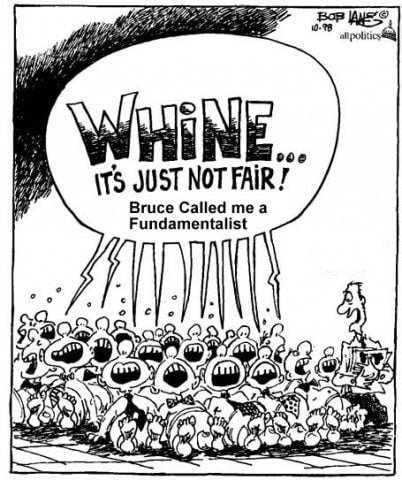
Those who spent decades in Evangelicalism before deconverting often find it hard to completely rid the mind of Fundamentalist thinking. Wait a minute, Bruce, are you saying that Evangelicals are FUNDAMENTALISTS? Yes. Evangelicalism is inherently Fundamentalist. (Please see Are Evangelicals Fundamentalists?) I have had countless Evangelicals attempt to persuade me that THEY are not Fundamentalists, but in the end, all they proved is that they were either liberal Christians masquerading as Evangelicals or — drumroll, please — FUNDAMENTALISTS! As the aforementioned post shows, all Evangelicals are theological Fundamentalists. Where Evangelicals tend to differ with one another is over what I call social Fundamentalism. For example, one Evangelical might be an Independent Fundamentalist Baptist (IFB) preacher. He has all sorts of narrow, defined social rules by which he governs his life. Another Evangelical used to be an IFB preacher, but now, PRAISE JESUS, he is the pastor of a non-denominational Sovereign Grace church. He has abandoned many of his former social rules and brags about being free to drink beer, smoke cigars, watch TV, and even cuss a bit. See, he says, I am NOT a Fundamentalist. Except, he still is theologically. He still believes the Bible is inspired and inerrant. He still believes in the exclusivity of Christianity. He still believes that there is one true God — his — and salvation is only through the merit and work of Jesus. He still believes that non-Christians go to Hell when they die, even if he doesn’t believe that there are literal fire and brimstone in Hell. His theological beliefs scream FUNDAMENTALIST! And even if he has distanced himself from the rules, regulations, and standards of his IFB past, if you press him you will likely find that he still has quite a long list of behaviors he deems “sinful.” Thus, I stand by what I said, Evangelicals are inherently Fundamentalist. Now that we have that issue out of the way . . .
Evangelicalism is built on a foundation of religious indoctrination. From the cradle to adulthood, Evangelicals are repeatedly taught what are believed to the tenets of the One True Faith®. For those of us raised in the Evangelical church, these beliefs were pounded into our heads day after day, week after week, and year after year. Not only at church either. Many Evangelical children attend Christian schools or are homeschooled. My wife and I homeschooled all six of our children. Using Bibliocentric curricula, our children were bombarded with Evangelical dogma. In our home, there was no escaping the Evangelical Jesus. Imagine, then, what this immersive approach does to the minds of children, teenagers, and adults. That’s why it is almost impossible to reach Evangelicals who have been raised this way. As long as they are certain their beliefs are right and everyone else is wrong, there’s no God but theirs, and the Bible is a divine roadmap/blueprint for life, there is little anyone can do to reach them.
But, Bruce, you were once an Evangelical and now you are an atheist, so it is possible to reach Evangelicals, right? Yes, but not until certain things happen.
First, Evangelicals must entertain the possibility that they could be wrong. As long as they are certain their beliefs are true and all other beliefs are false, no amount of argumentation will reach them. If, however, they have doubts and questions, well, then, it is possible to reach them. Not probable, but possible.
Second, once Evangelicals have doubts and questions, they must be willing to seek answers outside of their churches and circle of Evangelical friends. This is a crucial point. Remember, Evangelical pastors and churches believe the antidote to doubt is faith. The solution, then, is to cling to the basics, believing that God will, in time, make all things known. And if he doesn’t? Doubters are encouraged to keep on believing until the day comes in Heaven when their faith shall be made sight. Years ago, I heard an IFB evangelist say that resolute faith was the solution to doubt; that there would come a day when doubters would be glad they believed. That day, of course, is after death, when supposedly Evangelicals will finally learn how right they were, and gleefully rejoice over the fact that the Bruce Gerencsers of the world are burning in Hell. In other words, there’s a big payoff coming, so hang on. Is that not what Jesus said in Matthew 10:22: he that endureth to the end shall be saved?
Third, doubting Evangelicals must be willing to lose everything in their search for truth. Doubters must not settle for pat answers, proof texts, or personal anecdotes. They must be willing to follow the path wherever it leads, even if it leads them away from all they have ever known. Countless Evangelicals sit in churches or preach from pulpits, their minds filled with questions and doubts. Unwilling to venture away from the safety of their churches and beliefs, they condemn themselves to lives of — dare I say it? — quiet desperation. Only when they are willing to do whatever is necessary to answer their doubts and questions are they ready to begin their journeys away from Evangelicalism.
Many readers of this blog understand the path I have sketched above. Often, it is a long, arduous, painful road. And even after we have successfully extricated ourselves from Evangelicalism, we find that lifelong Fundamentalist indoctrination leaves behind vestiges of our religious past. I left Christianity in November 2008, but eleven years later Christianity is still hanging on in the deep, dark recesses of my mind. Of course, Evangelical apologists tell me that those niggling doubts are the Holy Spirit, that God has not yet abandoned me. That’s one answer, I suppose, but a better answer is that I was indoctrinated for almost fifty years, and it takes time to fully flush one’s mind of Fundamentalist thinking.
For several years after I deconverted, I would, from time to time, worry about whether I was wrong about Christianity. In the still of the night, I would have thoughts about God’s judgment and Hell. Bruce, if you are wrong, you are going to fry, I thought. But, as time went along, I had fewer and fewer thoughts about “eternity.” Now, when such thoughts pop up, I chuckle and ignore them. I know my mind is littered with memories of past religious beliefs and practices, so I expect their appearance from time to time. They are no different from the thoughts I have about girls I dated when I was a teenager. Nothing more than relics from my past.
I am often asked by ex-Evangelicals, when do the nagging doubts and fears go away? I tell them, it takes time. If you were an Evangelical for your entire life, you can’t expect to have a mind free of past beliefs overnight. There are no Men in Black neuralyzer mind wipes available for ex-Evangelicals. That said, filling one’s mind with non-religious learning can help. New, fresh knowledge helps push from our minds past religious indoctrination. That’s why I always encourage Evangelicals to read Dr. Bart Ehrman’s books. Knowledge in, junk out. The more you read, study, and know, the less past beliefs will have a hold over you.
How about you? Are you an ex-Evangelical? Were you raised in the Evangelical church? Do you still have what I call, an Evangelical hangover? Do you still have doubts or fears at times? Please share your thoughts in the comment section.
About Bruce Gerencser
Bruce Gerencser, 62, lives in rural Northwest Ohio with his wife of 41 years. He and his wife have six grown children and twelve grandchildren. Bruce pastored Evangelical churches for twenty-five years in Ohio, Texas, and Michigan. Bruce left the ministry in 2005, and in 2008 he left Christianity. Bruce is now a humanist and an atheist. For more information about Bruce, please read the About page.
Are you on Social Media? Follow Bruce on Facebook and Twitter.
Thank you for reading this post. Please share your thoughts in the comment section. If you are a first-time commenter, please read the commenting policy before wowing readers with your words. All first-time comments are moderated. If you would like to contact Bruce directly, please use the contact form to do so.
Donations are always appreciated. Donations on a monthly basis can be made through Patreon. One-time donations can be made through PayPal.

